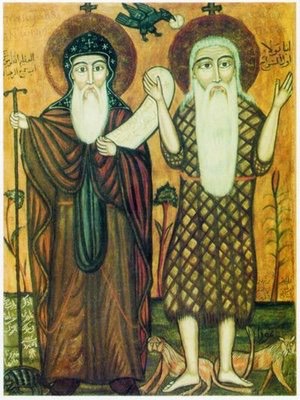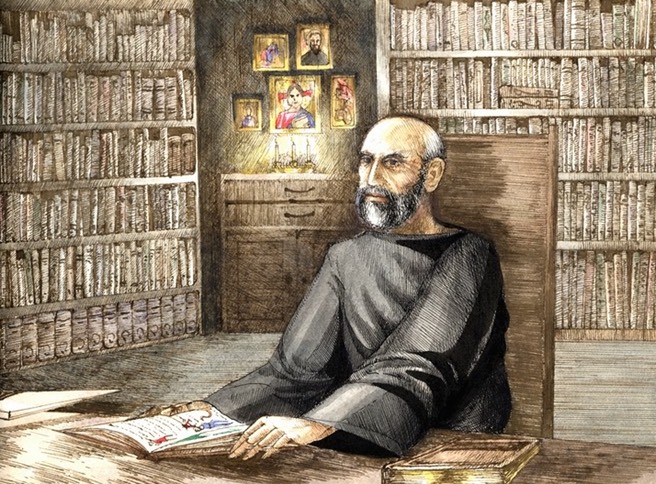UKRAINIAN ORTHODOX CHURCH IN AMERICA

THE DUTIES OF ABBOTS
Summarily, the Abbot, by virtue of his office, administers the temporal possessions of the community, exercises a general supervision for the maintenance of monastic discipline, provides for the keeping of the Rule, punishes and, if need be, excommunicates the refractory, presides in choir during the recitation of the Office, and at Divine Service, and gives the blessings. In a word, uniting in his person the threefold office of father, teacher, and ruler, it is the duty of the Abbot to see that all things are administered wisely in the House of God.
The chief duties of the Abbot of the Monks of New Manjava, Solus Christi Sketes, and of all Abbots within the Ukrainian Orthodox Church in America, are:
SPIRITUAL DUTIES OF THE ABBOT
Spiritually, and in accordance with the patrimony of monastic life, the Abbot, once canonically elected, confirmed and blessed, holds the place of Christ in the monastery and assumes the following duties and privileges:
1. The Abbot is the spiritual father and pastor of the community, elected by the community, in sacris, for life. He is shepherd, teacher and pastor of souls in the community, responsible for both the bodies and souls of the brethren and is properly addressed by the title Father. The obedience shown to the Abbot is regarded as obedience paid to God Himself, and all the respect and reverence with which he is treated by the brethren of his house is paid him for Christ's love, because as abbot — father — he is the representative of Christ in the midst of the brethren. The whole government of a religious house depends upon the Abbot. His will is supreme in all things; yet, as the Rule says, nothing is to be taught, commanded, or ordered beyond the precepts of the Lord. The Abbot should be prepared to lead by example, to treat all monks equally and to both rebuke and encourage his flock and assure that the life of the communities is in accord with the description of the early Christian community in Acts:
“The multitude of the faithful had one heart and one soul, and no one called his possessions his own, but they held them all in common, and great grace was upon
2. The Abbot is steward of the patrimony of the monastery, elected for life, insuring that life in the monastery and sketes is both evangelical and apostolic.
3. The Abbot is the general administrator of the resources of the monastery and administers and governs everything according to custom.
4. The Abbot appoints all officials for the administration of the monastery and sketes.
5. The Abbot, when not serving in the capacity of his Holy Orders, presides in choir during the recitation of the Divine Office and at Divine Services.
6. The Abbot shall visit annually, or as needed, with each monastic of each of the sketes.
7. The Abbot convokes and presides over chapter meetings. In general, he is responsible for the agenda of chapter meetings and posts the time and agenda of chapter meetings.
8. The Abbot oversees the continuing education of the monastics. The Abbot gives conferences himself and arranges for conferences by guest speakers. The Abbot approves the studies of the monastics, especially those studies which require a monastic to be away from the monastery.
9. The Abbot presents candidates for ordination to the Bishop.
10. The Abbot approves the selections for public reading.
11. The Abbot oversees the formation program. He gives classes to the postulants and novices and oversees the training and formation of the Rassaphores.
12. The Abbot bears ultimate responsibility for and is the final arbiter of the liturgical life of the community, scheduling the liturgical life of the monastery and sketes and monitoring observance of the liturgical and prayer life of the monastery and sketes according to the Rule, Typicon and custom(s) of each monastic community;
13. The Abbot has the powers and faculties granted to major superiors.
14.The Abbot oversees the care of the infirm.
15. The Abbot visits the monasteries’ benefactors whenever it seems appropriate to do so.
16. The Abbot, within the monastic setting, is the spiritual director of the community.

ADMINISTRATIVE DUTIES OF THE ABBOT
Administratively, the Abbot, once canonically elected, confirmed and blessed, has the authority:
1 - To convoke the general chapter, both ordinary and extraordinary, and to preside at it; to propose what is to be acted upon in General Chapter, after previous deliberation with his council, and to publish the decrees of the Chapter;
2 - To see that the decrees and decisions of the General Chapter are implemented;
3 - To convoke meetings of his council and to preside over them;
4 - To decide with his council all matters which can neither be settled properly by the individual abbots nor be postponed until the next general chapter;
5 - To act as judge of first instance in a dispute between two autonomous houses of the Community, unless one of the parties to the dispute is the monastery of the president, in which case the judge of first instance is the abbot senior by election to the council;
6 - To submit petitions to the Metropolitan Prime Bishop in the name of the Community and for the Community;
7 - Having heard his council, to appoint a procurator general who will care for the affairs of the Community with the Metropolitan Prime Bishop;
8 - To appoint an archivist for the Community;
9 - To keep in his custody the seal of the Community, which he will affix to documents of major importance;
10 - To maintain a file of all documents and correspondence pertaining to the Community; at the end of his term of office to send the current papers to his successor, and the papers related to past transactions to the archives of the Congregation through his successor;
11 - To take care that all noteworthy matters affecting the entire Community be recorded, and be reported to the general chapter, if need be;
12 - To send to the Metropolitan Prime Bishop a documentary report, signed by himself and by his council, on the state of the monasteries of the Community, whenever that is required;
13 - To collect the required subsidies from the monasteries of the Community, to administer the funds of the Community, and in each general chapter to present a financial statement of that administration;
14 - To make the ordinary visitations of the autonomous monasteries and, having heard his council, to make an extraordinary visitation of any of them; to delegate the powers of a canonical visitator, by the very act of appointing an abbot or a monastic to that duty;
15 - To receive recourses and appeals, which may be addressed to him freely by monks of the Community;
16 - To correct serious abuses and grave faults which the superior of a monastery fails to amend;
17 - To exempt a community temporarily from observing a particular disciplinary provision of the Typicon or of the Statutes;
18 - To preside at the election of an abbot or a local superior and to confirm it, except in the case for which provision is made in the Typicon; to admit or reject a postulation if the impediment to election is one from which he can dispense; to choose and appoint an administrator according to the norms of when it is expedient to prolong a vacancy of abbatial office;
19 - With the consent of his council, to accept the resignation of an abbot or of a local superior, or to remove an abbot or a local superior from office, if the welfare of the abbot or prior's community requires such an intervention;
20 - To petition the Metropolitan Prime Bishop to dispense a temporarily professed monk from his vows, with the consent of the monk's abbot and that abbot's council;
21 - To grant an indult of exclaustration to a perpetually professed monk, with the consent of the monk's abbot and that abbot's council, for a first period, which may not exceed three years;
22 - Having heard his council, to interpret a doubtful point in the Typicon or in the Statutes, the interpretation being valid until the next general chapter;
23 - To reduce Divine Liturgy obligations temporarily or on an emergency basis;
24 - The abbot may engage a secretary or administrative assistant;
25 - If the abbot resigns his office, or is canonically impeded from functioning any longer as abbot, or dies, all his duties and rights, until the next general chapter, pass to the abbot senior by election to the abbot council;
26 - If the abbot wishes to resign, his resignation shall be tendered to the abbot senior by election to the abbot council who, having heard the other councilors, will accept or reject the resignation.